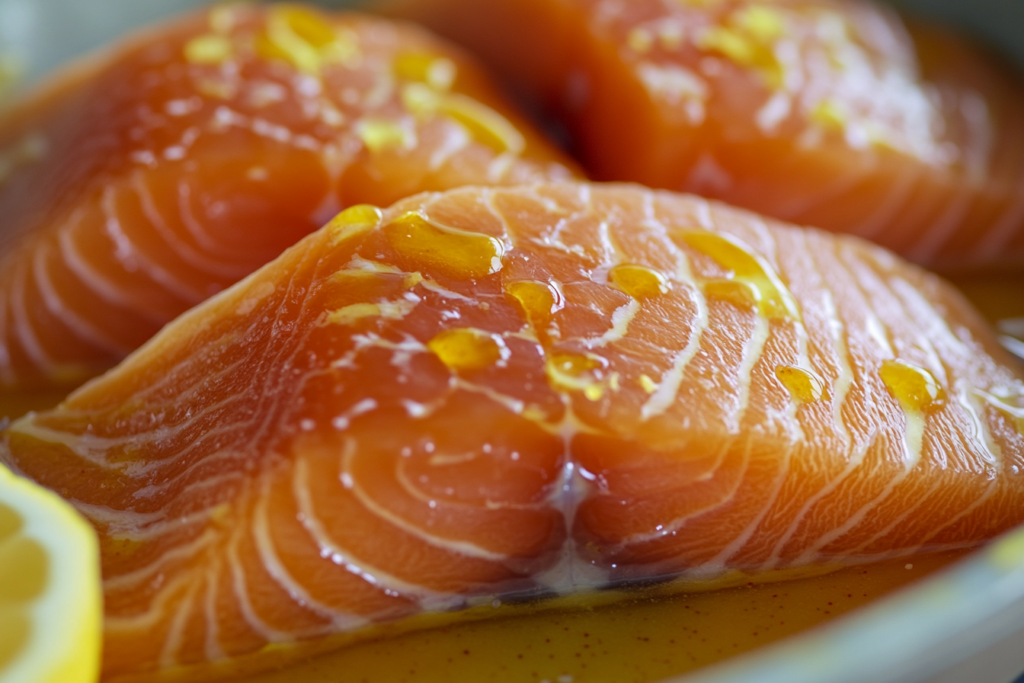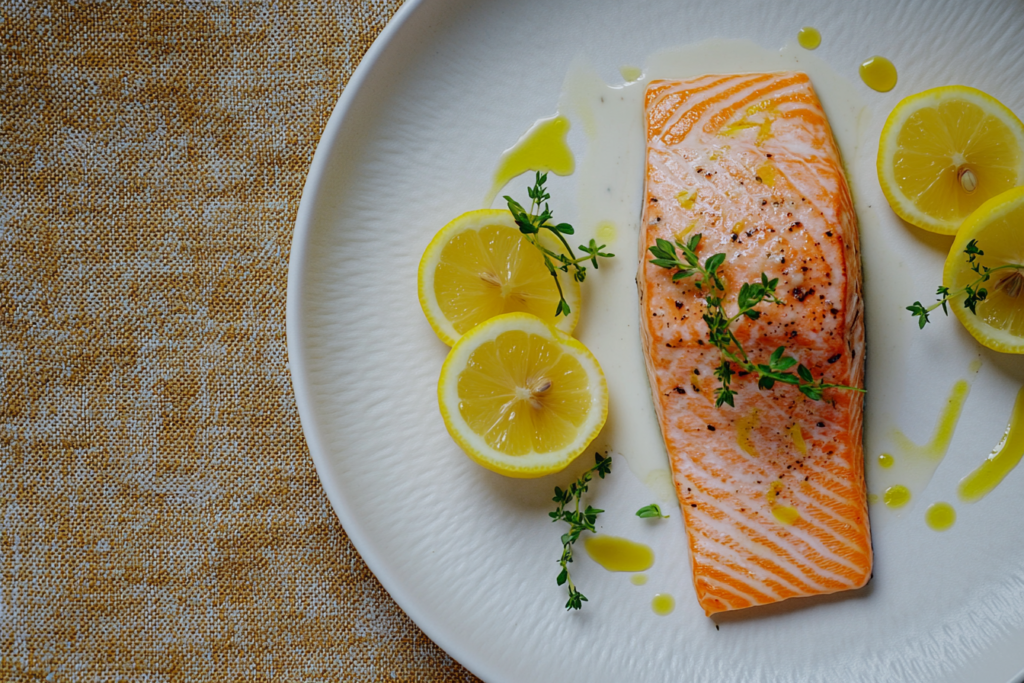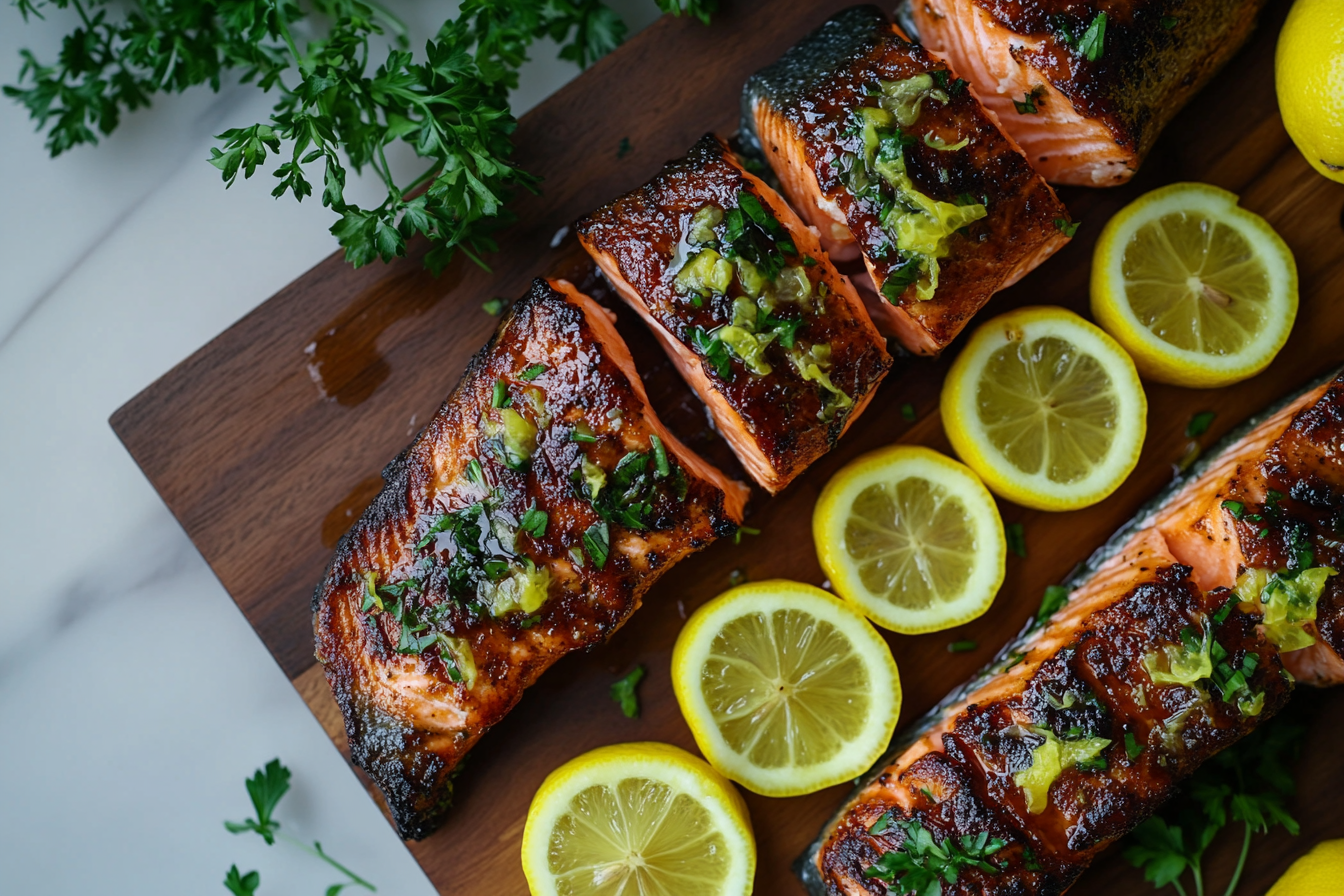A bright burst of citrus helps enhance flavor, reduce odor, and boost nutrition when preparing salmon.
Many home cooks wonder why do people put lemon juice on salmon? The short answer revolves around flavor, aroma, and culinary tradition. Lemon juice brightens salmon’s taste, reduces its sometimes-strong smell, and can even improve its texture. However, there is far more depth to this practice than meets the eye. This guide explores everything you need to know about adding lemon juice to salmon, from the chemical reaction that occurs to the cultural traditions that led to this widespread technique.
Read more about the health benefits of citrus fruits here. Why do people put lemon juice on salmon? They do so chiefly because the acidity helps break down proteins on the salmon’s surface. Additionally, the bright taste enhances the fish’s natural richness. Explore safe handling guidelines from the USDA. Although salmon stands out as a fatty fish, lemon’s acidic bite helps balance the mouthfeel.
Visit WebMD for general fish consumption advice. The synergy between salmon and lemon is not accidental. Correspondingly, this practice has a long history in global cuisines. Over centuries, people discovered that citrus juices reduce “fishy” flavors. Comparatively, lemon’s tang counters the fattiness of the fish. Henceforth, the pairing of salmon and lemon became more than mere habit—it’s a well-established staple of cooking fish worldwide.
Introduction
Lemon is a popular garnish, marinade component, and cooking ingredient for salmon. Explicitly, it’s one of the most recognized ways to handle fish. People often ask why do people put lemon juice on salmon? The reasons range from practical aspects of altering flavor to preserving freshness. Nevertheless, the best approach involves understanding both tradition and science.
Initially, many cultures marinated fish in acidic liquids to preserve it. In modern times, we rely more on refrigeration. Therefore, the lemon’s role has evolved into a flavor enhancer. Surely, salmon lovers around the globe find that a squeeze of lemon imparts a fresh brightness.
The Basic Properties of Salmon
Salmon is a widely consumed fish that many people cherish for its rich taste. Albeit oily, salmon is quite versatile in the kitchen. Its distinct flavor pairs well with a wide range of seasonings. Generally, salmon’s popularity soared in the United States during the twentieth century. Health-conscious individuals value salmon for its omega-3 fatty acids and high protein content.
Moreover, salmon is known for its vibrant color, which can be pinkish-orange or bright red depending on species. Certainly, the fish is an excellent source of nutrients, including vitamins B12 and D. Another reason it appeals to home cooks is how easily it adapts to different cooking methods: grilling, baking, broiling, or poaching.
Comparatively, other fish might have a milder flavor. Salmon’s bold taste can benefit from citrus. Hence, home cooks often reach for lemon to strike a balance between richness and brightness.
The Role of Lemon Juice with Salmon
Why do people put lemon juice on salmon? The simplest explanation is taste. However, there is a chemical interaction that offers tangible benefits. Lemons contain citric acid. When it meets the fish’s proteins, it helps soften the surface. Thus, the first bite becomes more tender. Additionally, lemon juice can help neutralize fishy odors that many find unappealing.
Concurrently, that citrus tang highlights the succulent qualities of salmon. In other words, lemon juice acts like a spotlight, making flavors pop. During cooking, you often see lemon slices placed atop fillets or spritzed onto a finished dish right before serving. Both timing and amount matter, though. Otherwise, too much acidity can toughen the texture.
Altogether, lemon helps maintain the fish’s color and preserves its freshness. Evidently, these benefits demonstrate why lemon has become such a standard partner for salmon. Overall, adding lemon to salmon is an example of how a single ingredient can transform an entire culinary experience.
Historical and Cultural Perspectives
Lemons and other citrus fruits have roots in ancient cuisines. Historical texts show that people in regions such as the Mediterranean and Southeast Asia marinated fish with citrus to prolong its shelf life. Basically, citrus juice was a natural preservative before modern refrigeration. Even so, the combination stuck around long after. Certainly, flavor was a driving force.
Initially, ancient Romans combined citrus with fish in sauces. Later, Arab traders introduced lemons across Europe, further popularizing the fruit. Following the spread of lemons, Europeans used lemon juice to mask pungent aromas in fish. Eventually, explorers brought citrus to the Americas.
Comparatively, today’s practice is less about preservation and more about taste. Nevertheless, these historical underpinnings explain why many cultures have a tradition of dressing fish with lemon or other acidic components. Altogether, this synergy has become a defining feature in many global cuisines.
The Science of Citrus and Fish
Why do people put lemon juice on salmon? Citrus fruits like lemons contain high concentrations of ascorbic acid (vitamin C). Henceforth, when lemon juice comes into contact with fish proteins, a slight denaturation occurs. This changes the fish’s surface texture, somewhat mimicking a “cooked” look in recipes like ceviche. Conversely, when heat is introduced, the combination of acid and warmth can further accelerate certain chemical reactions.
Equally, the acidic environment slows bacterial growth, albeit not enough to replace proper cooking or storage. Nevertheless, it helps keep the fish fresher for a longer period. Certainly, salmon’s flavor intensifies when paired with lemon, as the acid helps release volatile compounds that carry taste. Overall, the result is a refined flavor experience that many find delightful.
Doubtedly, one might think any type of acid would do the same job. However, lemon’s distinct citrus notes add another layer of complexity. Therefore, lemon remains the top choice for enhancing salmon’s taste.
Flavor Profiling: Salmon and Lemon
Salmon has a high fat content, making it succulent and flavorful. Thus, it may taste heavy or “fishy” to those not accustomed to bold seafood flavors. Lemon, being highly acidic, cuts through that fattiness. Similarly, lime or even vinegar can accomplish some of the same tasks. Notwithstanding, lemon’s bright aroma offers a unique zest that complements salmon’s rich profile.
Certainly, many chefs highlight that lemon’s aromatic oils create a refreshing smell. Because lemon peel contains limonene, it provides extra tanginess if you use zest. Hence, the taste synergy is twofold: the acidic juice modifies the fish’s surface, while the aromatic oils contribute a pleasing scent.
Surprisingly, a small sprinkle of lemon zest or drizzle of lemon juice can make a major difference. Moreover, it pairs well with other ingredients like butter, garlic, dill, or rosemary. Henceforth, you see classic recipes calling for a lemon-butter sauce or lemon-herb marinade.
Health Benefits of Lemon Juice on Salmon
When discussing why do people put lemon juice on salmon?, one factor is health. Certainly, salmon is already nutritious. Its omega-3s support heart health, and its high protein content aids muscle growth. Lemon juice brings extra vitamin C into the mix. Additionally, vitamin C helps your body absorb iron and may support immune function.
Furthermore, replacing salt with lemon juice can reduce sodium intake, which can be beneficial for those watching their blood pressure. Henceforth, sprinkling lemon on salmon helps you maintain robust flavor without over-relying on salty seasonings. Overall, the result is a healthier dish that doesn’t compromise on taste.
Moreover, the acid in lemon juice can partially break down proteins, making the salmon easier to chew and digest. Evidently, this doesn’t mean you should rely on lemon alone as a method of cooking. Nevertheless, it offers a boost to the final meal’s nutritional value.
Cooking Techniques Involving Lemon

In the following segment, let’s examine specific cooking methods. Incorporating lemon juice can happen at different stages. Firstly, you can marinate the salmon with lemon before cooking. This infuses the flesh with tang. Secondly, you can add lemon slices on top of salmon while grilling or baking. This steams the fish beneath a citrusy canopy.
Occasionally, people prefer to drizzle fresh lemon juice after cooking to preserve that fresh, uncooked citrus flavor. Because some cooking methods, like grilling, can diminish the brightness, a fresh squeeze just before serving intensifies the experience. Generally, a mixture of melted butter, lemon juice, garlic, and herbs creates a standout sauce for baked salmon.
Additionally, in raw preparations like ceviche, lemon actually “cooks” the salmon by denaturing the proteins. Therefore, the salmon’s color and texture change even though no heat is used. Incidentally, many find this dish to be bright, acidic, and very refreshing.
Expert Opinions and Chef Secrets
Professional chefs frequently highlight salmon’s delicate nature. Explicitly, they warn about overcooking or oversoaking in lemon-based marinades. Comparatively, marinating for too long can lead to a mushy texture. Chef Thomas Keller once advised minimal marination time for fish to preserve its integrity. Thus, you achieve a perfect blend of taste and texture.
Moreover, star chefs like Gordon Ramsay or Wolfgang Puck often show how a simple lemon-butter sauce can elevate salmon to a restaurant-quality meal. Further, they emphasize using fresh lemons rather than bottled juice for maximum zest. Certainly, the difference in taste is noticeable. Likewise, many culinary schools teach the importance of balancing acidity with fat, and salmon’s fattiness demands an acidic counterpart.
In the ensuing segment, you’ll learn about possible mistakes. Notwithstanding, a bit of caution and attentiveness can help you avoid a ruined dish. Therefore, follow the guidelines for timing and portion control when using lemon.
Additional Seasonings That Pair with Lemon
Lemon rarely travels alone in a salmon recipe. Chiefly, fresh herbs like dill, basil, or thyme accompany citrus quite well. Similarly, black pepper, paprika, or chili flakes can add a kick to the tanginess. Though lemon is enough on its own, layering in other flavors can produce a more dynamic dish.
Concurrently, pairing lemon with garlic is a time-honored tradition. The garlic’s pungent quality melds with the lemon’s brightness. Forthwith, you get an aromatic marinade that soaks into the salmon. Certainly, butter or olive oil can be used as a base for these flavors. Hence, you create a sauce or drizzle that coats the fish.
Undoubtedly, you can experiment with sweet elements, too. Honey-lemon glaze is a popular twist. Comparatively, maple syrup or brown sugar can be combined with lemon for a sweet-and-sour flair. Nevertheless, the lemon remains the star in these combinations, tying the flavors together.
Common Variations and Regional Specialties
Citrus-based salmon dishes vary across cultures. In the next division, we’ll explore how different regions use lemon:
- Mediterranean Style
Often, the salmon is dressed in olive oil, lemon juice, garlic, and herbs like oregano or rosemary. Basically, it reflects a bright, fresh taste typical of Mediterranean diets. - Japanese Influences
Specifically, chefs might use yuzu, a Japanese citrus, or ponzu sauce. Likewise, lemon can be served as a garnish with sashimi or lightly seared salmon. Comparatively, Japanese cuisine loves balancing flavors with acidity. - North American Approach
In particular, Americans might incorporate lemon pepper seasoning, a pre-blended mix of dried lemon zest and pepper. Likewise, they might glaze salmon with a mixture of lemon juice and maple syrup for a sweet-savory finish.
Basically, each region adds its local twist. Nevertheless, lemon remains a unifying factor. Furthermore, these variations highlight the versatility of salmon.
Practical Tips for Home Cooks
Moving to the next part, we’ll dive into best practices. Selecting fresh salmon is crucial. Certainly, start with a piece that smells clean and oceanic, not overly fishy. The flesh should be firm and brightly colored. Moreover, consider whether you want wild-caught or farmed salmon. Wild salmon typically has a more intense flavor and firmer texture.
Storing lemon juice properly is also key. Obviously, fresh-squeezed juice is best. If possible, buy whole lemons and squeeze them right before use. Additionally, if you must store leftover juice, seal it in an airtight container and refrigerate. Comparatively, bottled lemon juice can taste muted or artificial.
Timing the application of lemon matters, too. Typically, a short marination of 15 to 30 minutes is ideal. Undoubtedly, leaving salmon in an acidic marinade too long can break down the proteins excessively, resulting in a mushy texture. Likewise, if you’re grilling salmon, brushing with lemon in the last few minutes can help prevent overcooking the surface.
Choosing the Right Type of Lemon
All lemons are not the same. In the next subsection, let’s see how they differ:
- Eureka Lemons
Basically, the most common supermarket variety. High acidity, bright flavor, and decent juiciness. - Meyer Lemons
Comparatively, these are sweeter and less acidic, sometimes with a hint of mandarin orange. Hence, they’re great for a more subtle flavor. - Lisbon Lemons
Likewise, they’re quite similar to Eureka. Occasionally, home cooks find them a bit more pungent.
Nevertheless, each variety offers a distinct flavor profile. Certainly, you can experiment to find the lemon that complements your salmon best. Furthermore, if you want even more distinct tastes, you can try limes or oranges. However, the bright flavor of lemon remains the most classic choice.
Frequently Asked Questions (FAQ)
1) Why do people put lemon on salmon?
People do it because lemon brightens salmon’s flavor, masks strong odors, and softens the fish’s texture. Additionally, the acidity helps preserve freshness during cooking, making it an essential ingredient in many salmon recipes.
2) What does lemon juice do to raw salmon?
The acid in lemon juice denatures the proteins in raw salmon. Thus, it can partially “cook” the fish, changing the color and texture. Nevertheless, it doesn’t kill bacteria like heat does, so proper handling remains important.
3) What is the purpose of lemon juice on fish?
Lemon juice enhances taste, neutralizes fishy odors, and offers mild preservative qualities. Furthermore, it adds vitamin C and reduces the need for excess salt.
4) Why is it common to dress fish with lemon juice?
It’s a longstanding tradition across many cultures. Overall, lemon’s acidity cuts through the natural oils, balancing the flavors and making fish more palatable. Moreover, it’s an accessible ingredient for home cooks and professionals alike.
Conclusion

Advancing to the next topic—our final thoughts. The use of lemon juice on salmon spans centuries and cultures. Surely, it remains popular due to its proven ability to elevate both taste and aroma. Particularly, it’s a simple technique that brings out the best in this nutritious fish. Altogether, whether you grill, bake, or serve salmon raw, a squeeze of lemon offers undeniable benefits.
Despite the simplicity, there is real science behind this pairing. The acidic properties in lemon denature proteins, reduce odor, and impart fresh vibrancy. Hence, you can rely on lemon to transform salmon from a strong, oily fish into a dish that is bright, savory, and thoroughly enjoyable.

